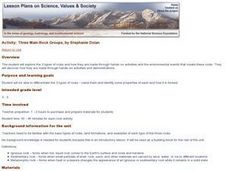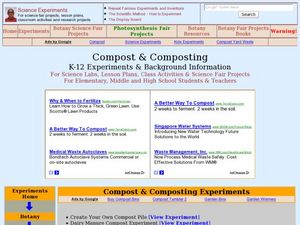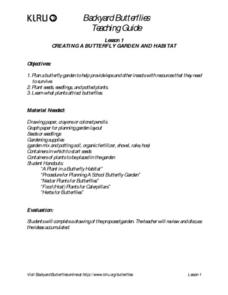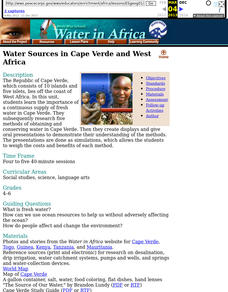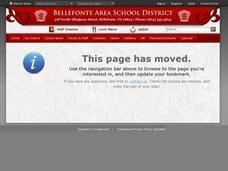Curated OER
What Do Snails Eat?
Students conduct a food choice experiment with snails, recording the results on a chart to determine what snails eat. In this what do snails eat instructional activity, students color a picture of snail anatomy, perform the...
Curated OER
4-H Horticulture/Garden Activity Page- Beginning
In this 4-H garden project worksheet set, student study the parts of seeds and plants. They make a mini-greenhouse. They complete a career scavenger hunt, tools word search, and experiment to learn more about the effect of water on seed...
Curated OER
Three Main Rock Groups
Students are introduced to igneous, sedimentary and metamorphic rocks. They use foods to demonstrate the basic formation of each type of rock, read books about rock formation and view related videos.
Curated OER
Lunch in Outer Space!
Students explore the challenges astronauts face while eating in outer space. In small groups, they design and construct an original model device to assist astronauts eat in a microgravity environment.
Curated OER
Compost and Composting Experiments
Students investigate the composting process through a variety of experiments. In this ecology lesson, students discuss the benefits of composting. They examine how compost affect plant growth.
Curated OER
Colored Drops
Students examine the properties of a liquid that contains water and food coloring and a liquid that contains water, food coloring and a liquid detergent. They interpret their data, describe properties, and make reasonable explanations...
Curated OER
Why Garden in New York State Schools?
A lovely presentation in which slide after slide outlines the many educational, physical, emotional, and social benefits of gardening in schools. This presentation is meant to be shown to parents, and would be a terrific choice to...
PBS
Creating a Butterfly Garden and Habitat
This complete set of instructions for creating your very own butterfly garden and habitat is so cool! With some seeds and the handy resources in this activity, you and your class will be able to determine which type of habitat is best...
Curated OER
Water Sources in Cape Verde and West Africa
Young explorers study the scarcity and importance of a continuous supply of fresh water in Cape Verde. They research the five main ways that fresh water is obtained in these countries. Each research group prepares a presentation, and...
Curated OER
Eco-Healthy Lunch
Students plan healthy lunches and how to dispose of their lunch waste. In this pre-field trip lesson, students and teachers plan healthy, nutritious lunches to bring on a field trip. They also discuss how to sort their garbage into the...
Museum of Tolerance
Cultural Research Activity
Class members explore cultural diversity through a variety of texts that showcase the importance of traditions. Then, they interview their family members to research their own cultural background and write their findings on quilt...
Curated OER
There Are Algae in Your House!
Students complete a worksheet at home stating what types of food they have at home with algae in it. They, in groups, compare with each other what they have on their worksheet.
Curated OER
Flavors and Favors
Students conduct a food drive. In this service learning instructional activity, students put on a school-wide food drive, decorate the bags the food will be delivered in and possibly even help distribute the food.
Curated OER
Mold
Students explore mold, the different types and the health risks that they pose. For this mycelium lesson students grow different molds and see which type of foods mold the fastest.
Curated OER
"Oh Deer!"
Students play a game where half of them are deer and the others are components of habitat: food, water, shelter and space. They signify their needs by hand gestures and take what they need to their side of the game. They discuss real...
Curated OER
Ocean Grazers Conclusion
Students research an ocean species. In this science lesson, students create a research presentation as a conclusion to the ocean grazers unit. Students present their projects to the class and complete a self-reflection paper.
Curated OER
Make A Crystal Snowflake!
Students make a crystal snowflake decoration out of string, pipe cleaners, food coloring, boiling water, and more. In this snowflake lesson plan, students let it dry over night and see crystals in the morning.
Curated OER
Endangered Ecosystems Grades 4-5
Learners read about research at the field sites. They read field reports from team members at the site. Students conduct their own research on ecosystems in their lives. They explore and build an interactive food web. Learners create...
Curated OER
Build a Thermometer
Learners build a thermometer. In this weather lesson, students use red food coloring, rubber stoppers, and hard plastic tubing to build a thermometer. Learners use their homemade thermometer to measure the temperature.
Curated OER
Oh Deer!
Pupils discuss the components necessary to keep animal populations alive . Then they participate in a game where they interact as deer, food, water, and shelter. The activity demonstrates that nature is not static, but changes with the...
Curated OER
Using Comics to teach Habitat and the Balance of Nature
Students visit a specific online comics website to view a comic. They discuss the elements of the food chain that were seen in the story. They choose an inhabitant of the pond habitat that they have been reading about and do a research...
Curated OER
Bivalve Biology
Young scholars place clams into a beaker containing saltwater. They place a small drop of food coloring just above the shell. Students observe the movement of the food coloring. Clams are then placed into clean beakers of saltwater with...
Curated OER
Composting Leftovers
For this composting leftovers worksheet, students set up an experiment with food waste and soil, observing and recording the differences for two weeks.
Curated OER
Aztec Floating Gardens
Aztecs created amazing hydroponic gardens called Chinampas, to grow their crops. Learners in grades k-7 engage in four mini-experiments to understand just how amazing floating gardens are. Tip: A perfect way to bring science into your...
Other popular searches
- Science Project Food Apples
- Science Project Food Chain
- Science Project Food Waste
- Science Project Food Rice
- Food Science Fair Projects
- Science Project Food Decay
- Science Projects Food Chain




